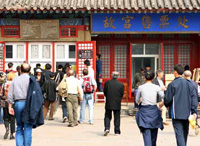
With China's seven-day Labor Day and the National Day holidays now entering their seventh year, the possibility of canceling the holidays, usually called "Golden Week" has become a widely discussed topic.
"Golden Week" seems to have been steadily losing its glitter, year by year, since the government first established it in time for National Day 1999. This isn't to say the week has lost its popularity. On the first golden week, in October 1999, 40 million people went traveling around the country.
By 2004 the number had increased 2.5 times to 101 million, according to statistics from the National Holidays Coordinating Office.
"Golden Week has been very effective in introducing the idea of vacation travel to Chinese, from the very beginning," said Xia Lingen, professor of the Tourism Management Department of Fudan University. Yet Xia also pointed out the number of travelers was smaller than the official figure, because some people were counted more than once.
After seven years of Golden Weeks, the number of Chinese travelers has increased to a point that little room for further growth remains. "The development of tourism is tightly related to the economy of the country. Only relatively affluent citizens consider vacation traveling," he said.
In fact, the average annual expenditure on tourism per capita in cities decreased from 450 yuan (US$54.22) in 2002 to 430 yuan (US$51.80) last year, while the figure for rural citizens was 220 yuan (US$26.50). "The figure is still quite low," Xia pointed out.
Unbearable burden
Due to the growth trend in domestic tourism, scenic spots and transportation systems are placed under growing pressure from Golden Week.
"It's not a big problem for Shanghai Railway Station but it's definitely challenging for smaller stations to receive four or five times the usual number of passengers during the week-long holidays, far more than any other time in the year excepting only Chinese Lunar New Year," said Yuan Jiaji, an official of the Shanghai Railway Administration.
The railway authorities have to add temporary trains during Golden Weeks for the wave of travelers heading out to the major scenic spots throughout the country.
Although the pressure is less intense than that occurring during the 40-day transportation peak around the Lunar New Year, Yuan noted that resources are wasted during the period because most of the trains carried passengers only one way.
"Trains coming back from scenic spots are empty (at the beginning of the Golden Week)," Yuan said.
As for the scenic spots themselves, the sudden rush of visitors swarming into them at the same time causes damage and environmental stress. For example, Sanya of South China's Hainan Province - a coastal resort - typically receives fewer than 2,000 visitors a day, but several times more during Golden Week, according to Professor Xia.
"Each place has a certain capacity for tourists, so scenic spots hope to see a regular flow of visitors every day, not just on holidays," he said. The positive effects of Golden Week have begun to fade, while the negative side has become more obvious, Xia added.
Possible alternatives
He was not the only person to suggest abolishing Golden Week. Many tourism industry experts have commented on the serious problems resulting from Golden Week. At the end of last year, the National Tourism Administration hosted a discussion on the question whether the holiday week should be cancelled, but the final decision was to continue with it.
Zhao Peng, a professor at Beijing Union University, said Golden Week was now disrupting the industry, since people were becoming unwilling to travel during fixed holidays for fear of crowds.
Experts narrowed the options down to two possible replacements for Golden Weeks during the discussion. One was called "small Golden Week," shortening weekends to one day and postponing the other four days off to the end of every month, thus providing more opportunities for vacations and removing some of the Golden Week pressure. The other idea was to introduce paid leave in all the workplaces in China.
The latter idea has been widely supported, even included in the blueprint for China's 10th Five-Year Plan (2001-05).
At present, Chinese citizens have a total of 114 days off every year (including weekends). According to the 10th five-year plan, workplaces should implement a paid leave policy by the end of this session with more holidays being given to citizens. Xia said the National People's Congress had considered making the traditional Qingming and Mid-autumn festivals into holidays.
However, Zhang Yuan, official of the Shanghai Municipal Labor & Social Security Bureau, said no detailed rules had been worked out to support the clause about paid leave in the Labor Law.
"It has been 10 years since the law was fixed but each work unit is still carrying on its own regulations in respect to annual leave," she said.
Although the end of the 10th Five-Year Plan is drawing near, she said the bureau had not yet started to undertake research into a set of specific regulations for the implementation of paid leave.
In addition to technical drawbacks, some people also questioned the wider effects of paid leave.
"Even if paid leave can be put into practice, it might not be practical for a family that wants to go on vacation together at the same time," said Huang Haiming, a source with the Shanghai China Travel Service.
He thought Golden Week still had the potential to promote the development of airlines and travel agencies, since it was a period when the average expense of travel increased by up to 30 per cent compared to the remainder of the year. According to Huang, who is in charge of tours to South Korea and Japan with the agency, the cost for a trip to Japan is usually 7,000 yuan (US$843) but it climbs to nearly 10,000 yuan (US$1,205) during Golden Week.
(Shanghai Star April 25, 2005)
|

